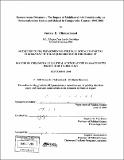Donors versus dictators : the impact of multilateral aid conditionality on democratization : Kenya and Malawi in comparative context
Author(s)
Clinkenbeard, Steven E., 1958-
DownloadFull printable version (36.46Mb)
Alternative title
Donors vs. dictators : the impact of multilateral aid conditionality on democratization : Kenya and Malawi in comparative context
Other Contributors
Massachusetts Institute of Technology. Dept. of Political Science.
Advisor
Stephen W. Van Evera.
Terms of use
Metadata
Show full item recordAbstract
Donors versus Dictators examines the "exporting democracy debate" and the related issue of "nation-building" as manifested in the foreign aid relationship in the post-Cold War era. This dissertation centers on two in-depth case studies of countries where all major donors froze aid on a multilateral basis in order to pressure authoritarian regimes to legalize opposition parties and hold democratic elections. Through careful historical process-tracing, hypotheses drawn from both sides of the debate and from the academic literatures on democratization, aid and economic sanctions are assessed with respect to the attempts at democratization in Kenya and Malawi from 1989 to 2003. Conclusions include the finding that aid conditionality is generally effective in producing multiparty elections and pushing the reform process forward in aid-dependent countries where incumbent regimes have historically been pro-Western and desire to remain engaged in the global economy. However, the ultimate effectiveness of donor policy in producing democratization in these cases has been limited by the patterns of ethnic cleavage within the recipient countries and the relative ability of the emerging constitutional and electoral systems to channel ethnic and clientelist politics in democratic directions, factors which have so far been beyond the scope and level of coherence of donor policy.
Description
Thesis (Ph. D.)--Massachusetts Institute of Technology, Dept. of Political Science, 2004. Includes bibliographical references (p. 461-493).
Date issued
2004Department
Massachusetts Institute of Technology. Department of Political SciencePublisher
Massachusetts Institute of Technology
Keywords
Political Science.